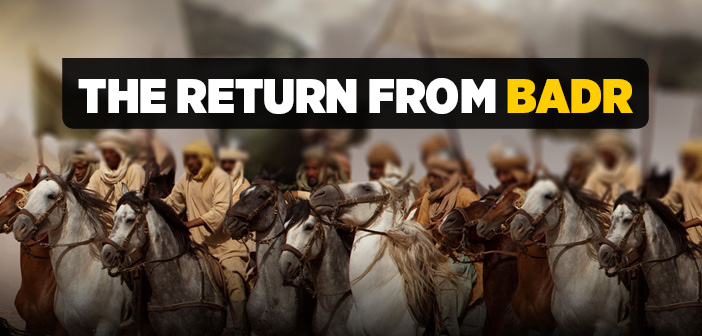What is handak? What happened in handak?
The entire Believers present, young and old, were doing all they could during the Battle, keeping guard by the narrowest parts of the trenches.[1]
Recounting below is the honorable Umm Salamah -Allah be well-pleased with her-:
“I was with the Messenger of Allah at Handak. I never left his side there or in any of the other places where he was. He was personally standing by the trenches. There, we were caught amid a blistering cold. I was staring at him; he had begun offering salat. We then walked off. After gazing towards the trenches for a while, he then said, ‘It looks like those are the idolaters’ cavalrymen making their way around the trenches. Who will stop them?’ He then called out, ‘Abbad ibn Bishr!’
‘Yes, Messenger of Allah’, Abbad -Allah be well-pleased with him- replied.
‘Is there anybody with you?’ asked the Messenger of Allah.
‘Yes…a few of your Companions and I happen to be waiting around your tent.’
‘Go and walk along the trenches with your friends! The cavalrymen who are visible from a distance seem to be of the enemy. They are coming for you; they wish to catch you off guard, make a sudden raid and kill as many of you as they can!’
The Blessed Prophet -upon him blessings and peace- then prayed, “O my Lord! Take their evil away from us! Help us against them and enable us to defeat them! There is no one but You who can make us victorious!”
Abbad ibn Bishr -Allah be well-pleased with him- took off with his friends to survey along the trenches, the narrowest part of which, at that instant, Abu Sufyan happened to be making a dangerous effort to cross with a cavalry unit. The small group of Companions got there right in the nick of time to shoot enough arrows and throw enough stones to force the idolaters to retreat. (Waqidi, II, 464)
Safiyya -Allah be well-pleased with her-, the Blessed Prophet’s -upon him blessings and peace- aunt, was at Hassan ibn Thabit’s large house, known as Fari, with the other women and children throughout. At one stage, a group of ten Jews came and showering the house with arrows, wanted to make a forced entry. One among them, especially, was clandestinely roaming around the house in hope of finding a passage through. The Blessed Prophet -upon him blessings and peace- was meanwhile in a heated clash with the idolaters at the trenches.
Unaided and thus with no other option left than to take the matter in her own hands, Safiyya -Allah be well-pleased with her- tightly tied a cloth around her head and with a pole in her hand, made her way down the stairs of the house. Quietly opening the entrance door, she furtively made her way behind the wandering Jew and swiftly yet effectively struck the pole across his head, killing him at the instant. Moments later, seeing their friend sprawled on the ground dead in the dark, the other Jews became alarmed. “We were told that the women here are protected by guards, weren’t we?” they said as they unceremoniously went their own ways. (Haythami, VI, 133-134; Waqidi, II, 462)
Aisha -Allah be well-pleased with her- recounts her observations of the enthusiasm of the Companions for jihad:
“I was observing the fighters during the Battle of Handak. I heard a voice coming from behind. I turned around and saw Saad ibn Muadh and his nephew Harithah ibn Aws. I sat down on the spot. He was wearing an armor around his chest and his arms were sticking out from the sides. He was reciting a poem that encouraged jihad and spoke of how beautiful death was once it arrived. His mother was yelling out to him, ‘Run, my dear…catch up with the Messenger of Allah, for you are running late!’
‘I would have liked to have seen Saad’s armor cover his entire body to his fingertips’, I said to Saad’s mother. I was worried he might be struck with arrows in his exposed arms.
‘Allah will realize His will, was all she replied. Saad was wounded that day.” (Ahmad, VI, 141; Ibn Hisham, III, 244)
Realizing his wound was fatal, Saad -Allah be well-pleased with him- prayed:
“O my Lord! If You have willed for us another battle with the idolaters of Quraysh then let me survive to see that day! For there is no other tribe I want to fight more than Quraysh, who have tormented and mistreated Your Messenger, denied him and expelled him out of his hometown! But if this is the end of our battles with them then let my wound serve as a cause for my martyrdom! Accept me in Your presence! And do not take my life until I see and rejoice the punishment of Banu Qurayza!” (Waqidi, II, 525; Ibn Sad, III, 423)
The minute Saad -Allah be well-pleased with him- completed his prayer, his bleeding stopped.[2]
The Blessed Prophet -upon him blessings and peace- had a tent erected for Saad -Allah be well-pleased with him- inside the Masjid, in order to able to frequently visit him and attend to him more closely.[3]
Only a handful of idolaters were able to cross the wide trenches. One of them was Amr ibn Abd, a warrior renowned throughout entire Arabia. His arrogant challenge was met with by Ali -Allah be well-pleased with him- who made light work of him. The others suffered a similar doom.
The Battle was ensuing; it seemed like it would never end. The Believers were caught in such a delicate and difficult situation that they were now desperately anticipating Divine aid. Their states are depicted in the Quran as follows:
“When they came upon you from above you and from below you, and when the eyes turned dull, and the hearts rose up to the throats, and you began to think diverse thoughts of Allah. There the believers were tried and they were shaken with severe shaking.”
“And when the hypocrites and those in whose hearts was a disease began to say: Allah and His Messenger did not promise us (victory) but only to deceive. And when a party of them said: People of Yathrib! There is no place to stand for you (here), therefore go back; and a party of them asked permission of the prophet, saying. Surely our houses are exposed; and they were not exposed; they only desired to fly away. And if an entry were made upon them from the outlying parts of it, then they were asked to wage war, they would certainly have done it, and they would not have stayed in it but a little while. And certainly they had made a covenant with Allah before, that) they would not turn (their) backs; and Allah’s covenant shall be inquired of. Say: Flight shall not do you any good if you fly from death or slaughter, and in that case you will not be allowed to enjoy yourselves but a little.” (al-Ahzab, 10-16)
“And when the believers saw the allies, they said: This is what Allah and His Messenger promised us, and Allah and His Messenger spoke the truth; and it only increased them in faith and submission.” (al-Ahzab, 22)
[1] Waqidi, II, 463-464.
[2] Tirmidhi, Siyar, 29/1582; Ahmad, III, 350.
[3] Bukhari, Maghazi, 30.
Source: Osman Nuri Topbaş, The Prophet Muhammed Mustafa the Elect II, Erkam Publications





